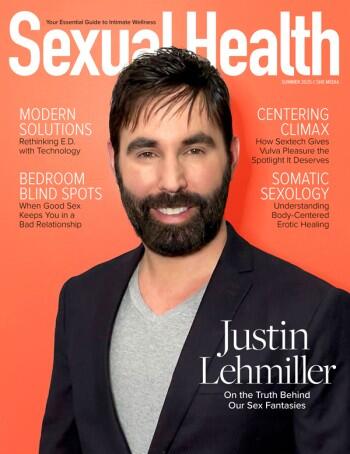As a manufacturer, our objective has always been twofold — firstly, to create unique sex toys that celebrate every body; and secondly, to make money. And as I’ve discovered along the way, the two are not mutually exclusive. Research has proved that there’s a huge well of untapped profit in providing accessible sex toys specifically designed for disabled users. Why, then, have they been so studiously ignored and sidelined by the sex toy industry? The more we learn about the industry, the more it seems like a particularly perverse omission, purely on the basis of fairness. As we’ve always said, pleasure is a fundamental right for everybody — and every body. But without accessible toys, people with disabilities are missing out on that pleasure.
Creating sex toys catering specifically to disabled users is a vital step in the direction of destigmatizing sexuality and pleasure in this active and vibrant sector. But unfortunately, few businesses make the decision to spend time and money on making adjustments to products that already work for most of their customers just for the sake of being able to boast inclusion.
Creating sex toys catering specifically to disabled users is a vital step in the direction of destigmatizing sexuality and pleasure.
So why do we do it?
The Ethical Obligation
When we started Hot Octopuss eight years ago, as two able-bodied people, I’m the first to admit I knew little about sex and disability. But it was clear that there weren’t any effective or fully inclusive options for disabled people, and the options there were, were very limited, which again, is the opposite of fair.
I once received a letter from a 25-year-old paraplegic man who hadn’t had an orgasm, masturbated or experienced any sexual pleasure since his accident. He wrote to thank us for our innovation, which had allowed him to masturbate and orgasm for the first time. His words of five years ago had a huge impact on me: “This product brought back a sense of joy, pleasure and self esteem to my life that I had thought was completely lost to me.”
His words made me remember that anyone, at any time, can go from able-bodied to disabled, and it was emotional to realize that one could lose so much more than your mobility in the process; that overnight, you could go from being a sexual being to completely overlooked. I knew then that we had an obligation to make sure, when it came to sexual pleasure, that nobody was left behind.
The Purple Pound
Did you know that people with disabilities make up 10 percent of the world’s population? Despite what one may assume, it’s a very large, fiscally significant consumer group — over 1 billion people globally, or to put it more simply, one in seven. This includes everything from mobility issues (there are approximately 75 million daily wheelchair users worldwide), strength, visual impairment and more. Suffice to say, this can hardly be considered a minority group, and ignoring their spending power is exceptionally shortsighted, especially in the sex industry. To use a comparison that might resonate, 2 percent of the world’s current population are redheads; if cosmetics businesses see the value in catering to their universally paler skin color, why on earth wouldn’t the sex industry cater for a demographic that’s far larger?
And regarding the spending power, otherwise known as the “Purple Pound” ... well, like the needs of the spender, it is not insignificant. Statistically, disabled people £249 billion a year to the U.K. economy alone — which means they’ll be able to afford the (potentially) higher costs that could be incurred when designing for different disabled needs (because clearly, one size won’t fit all). Not just that, they’ll be actively interested in contributing to the perfect product, so you’ll have a ready and willing pool of expert disabled consultants to utilize when it comes to creating new and better performing products.
The Creative Opportunity
Everyone’s looking for an undiscovered gap in the market, or a spot that could use a total facelift, and as far as I am concerned, accessibility and inclusion is that gap. I believe there is a clear lack of inclusive sex toys, a lack of variety within the small amount of products that exist, and a “one size fits all” approach that absolutely fails to address or interact with the practicalities of trying to masturbate or have sex while disabled — for example, when reach or grip are an issue. Add to that a failure by society to even acknowledge disabled pleasure (when was the last time you saw an unashamedly sensual film or TV depicting disabled sexuality?), and a general mainstream attitude towards disabled people as asexual, and there’s a pretty obvious area in which companies can really flex our innovation muscles.
With the help of a disability consultant, Kelly Gordon, I have realized the best way to create a toy that will sell in this market is to speak directly to our customers and keep the conversation going — not just about the products designed for disabled people (we do not have any products that are exclusively designed for people with disabilities), but for all our products. There may be easy modifications within budget that we could make to our mainstream products that could open up the world of pleasure even further — such larger buttons, longer handles, etc. In turn, this would help destigmatize, as well as make it a lot less stressful for a disabled person browsing to know that they don’t just need to explore the little corner of products we’ve designed for them — we aim to make inclusivity a feature that runs across everything we make.
We’re also committed to increasing the visibility of disabled sexuality, by using disabled models as well as non-disabled models across all our campaigns. But most importantly, we’re committed to communicating directly with our disabled customer base. It’s important to make sure that even if we get something wrong, we’re always working towards getting it right. We never want to go quiet or give up out of awkwardness in a sector of the market that’s been given the silent treatment for far too long. And who knows? The next big seller in sex toys could arise from that very conversation.
Julia Margo is the co-founder and COO of Hot Octopuss, which in 2013 created the world’s first “Guybrator.”









